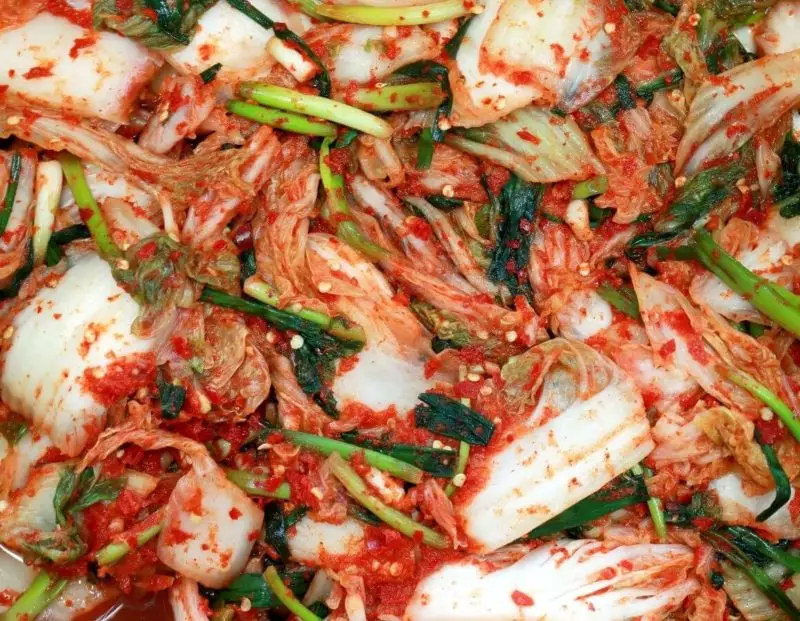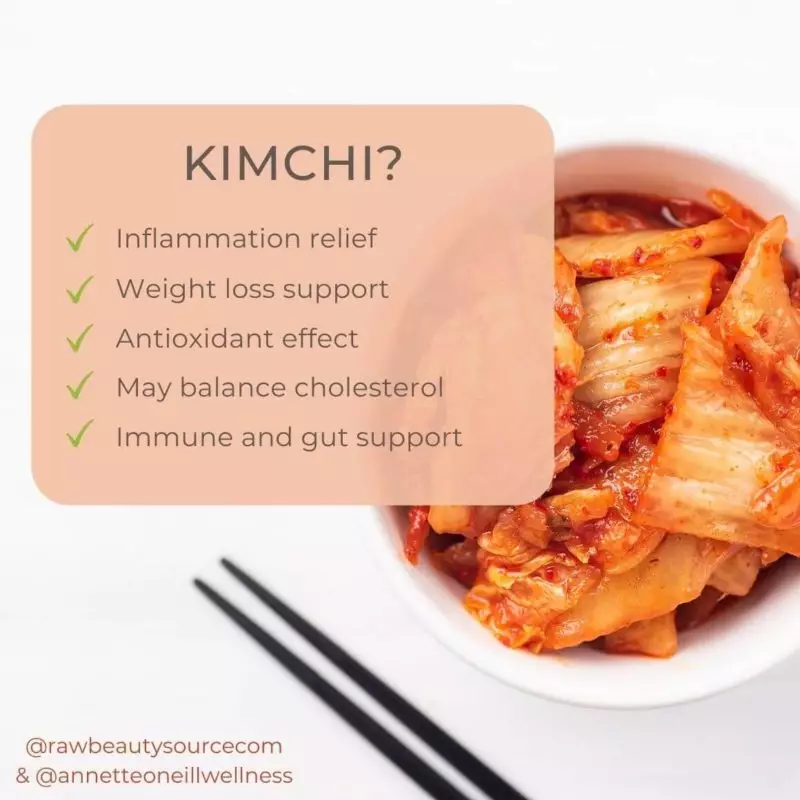
With the rising awareness about gut health and increasing popularity of probiotics, kimchi (together with other fermented foods like kefir, yogurt, and tempeh) has become a real star!
Kimchi is a Korean dish made from fermented vegetables and a wide variety of seasonings (e.g., chilies, garlic, and ginger). The veggies used for traditional kimchi are (napa) Chinese cabbage and (Korean) radish. Kimchi is often served as a side dish, but can be also added in soup, noodles, and other savory dishes.
It has a spicy and sour taste and slightly tingly flavor yet crunchy texture (when prepared correctly).
But apart from its unique taste and texture, kimchi has amazing healthy properties due to its high probiotic and micronutrient content.
But what micronutrients and healthy dietary compounds are found in kimchi? Why is eating kimchi healthy? How does it benefit your body? How to prepare it at home?
This article will answer all of these questions!
Let’s get started!
Why is kimchi healthy?
A 2017 paper published in the Journal of Ethnic Foods suggests that the traditional kimchi (made with Napa cabbage) is low in calories and fats, and is cholesterol-free. [1] In fact, ½ cup of kimchi offers you only about 15 calories while containing 1 gram of fiber (about 2% of daily fiber recommendation).
The same source suggests that traditional kimchi is rich in various micronutrients and healthy dietary compounds, including:
- Vitamin A
- Vitamin B
- Vitamin C
- Vitamin K
- Calcium
- Selenium
- Phosphorous
- Iron
- Phytochemicals (plant compounds with antioxidant effect)
- Probiotics (incl. Lactic acid bacteria)

That being said, kimchi is also rich in another mineral, which is controversial: Sodium (128mg in ½ cup of kimchi). As this fermented food is prepared with generous amounts of salt, it supplies the body with big amounts of sodium, which may negatively affect your health when built up in the body.
And considering that the average American consumes about 50% more sodium than recommended (average consumption being 3.400mg while the recommendation is up to 2.300mg [3]), consuming too much kimchi may pose health risks associated with excess sodium intake.
Yet, controlling and balancing your kimchi portions can help you benefit optimally from the healthy properties of the food.
Benefit from integrated and personalized approach to nutrition, health, fitness and healing. Check out the schedule for booking online yoga and barre classes, or book a nutrition consultation on Annetteoneillwellness.com!

Health benefits of kimchi
A 2014 review paper published in the Journal of Medicinal Food has looked into the impressive health benefits of regular kimchi consumption. [4] According to the source, when eaten in moderate amounts, kimchi may have the following healthy properties:
May reduce inflammation
The consumption of traditional kimchi may reduce inflammation in the body and may improve the symptoms of inflammatory or allergic reactions. [4]
May support weight loss
Kimchi is a low calorie food that can aid weight loss! Dietary compounds (like fiber, capsaicin, and different vitamins) in kimchi may help people manage their weight, reduce body fat, and prevent obesity and excess weight gain by controlling blood sugar levels, insulin secretion, and leptin synthesis (hormone responsible for satiety), as well as other metabolic parameters. [4] [5] [6]
Antioxidant effect
Antioxidants found in kimchi (polyphenols and vitamin C) may act against free radicals damage in the body, lower the impact of oxidative stress, and protect the body cells from damage.
Furthermore, the antioxidant properties of kimchi may be associated with anti-aging effects like improved collagen synthesis in the skin (thus, less wrinkles and fine lines), and improved resistance to UV damage (e.g., photoaging protection, which may improve skin pigmentation and overall youth). [4] [7]

May improve cholesterol profile
Regular consumption of kimchi (in moderate amounts) may improve cholesterol profile by lowering total cholesterol levels, reducing LDL (bad cholesterol which builds up in the arteries and may lead to increased risk of heart disease and stroke), and increasing HDL (good cholesterol that prevents artery buildup). [4] [8] [9]
May lower risk of cancer development
The antioxidants and lactic acid bacteria found in kimchi may play a role in cancer prevention by protecting body cells functions, suppressing the growth of pathogenic bacteria, regulating the bacterial abundance in the gut, and providing immune support. [4] [10]
May promote immune support and gut health
Since kimchi is food that has passed through a fermentation process, it likely has all the gut-health promoting benefits of fermented foods!

Other fermented foods to add to your diet include sauerkraut, probiotic yogurt, kefir, miso, and tempeh.
In fact, Dr. David S. Ludwig (a professor of nutrition at the Harvard T.H. Chan School of Public Health) says:
When the digestive tract has an unhealthy mix of organisms, it can actually lead to a weakening of the walls of the intestines, which start to leak their contents into the bloodstream — a condition referred to, not surprisingly, as leaky gut syndrome. Chronic exposure to these substances leaking out from the intestines has been linked to a host of health problems, ranging from asthma and eczema to schizophrenia and Alzheimer’s disease. [11]
How to make kimchi at home?
Making kimchi is easy! Here is a video with clear steps to help you out!








